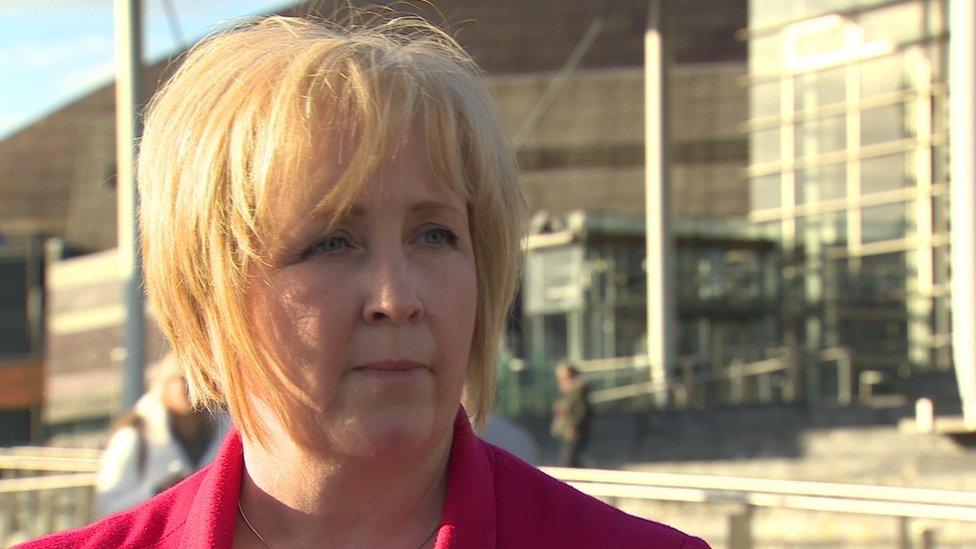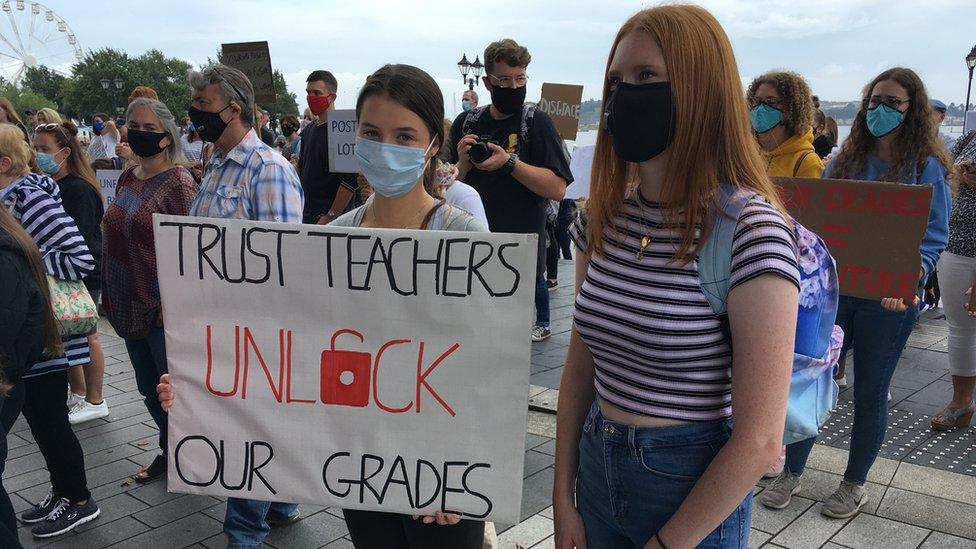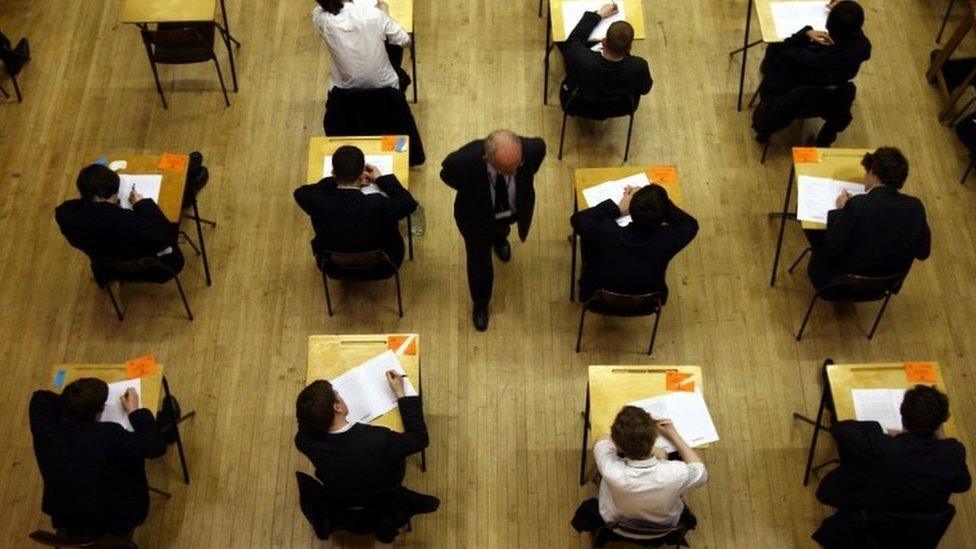A-levels: Pressure grows on Wales ministers over grades
- Published
- comments

Students gathered outside the Senedd at the weekend to protest against the grading system
First Minister Mark Drakeford will face his own Labour backbenchers later as criticism grows over last week's A-levels results.
A total of 42% of grades predicted by teachers were lowered.
Welsh Labour group chairman Vikki Howells and the Welsh Tories joined Plaid Cymru in calling for students to be honoured their predicted grades.
Education Minister Kirsty Williams has allowed appeals if "there is evidence" pupils should have had higher grades.
But pressure is growing on the Welsh Government to honour's students predicted grades.
Meanwhile six Welsh council education cabinet members say they have "no confidence" in the system which has allocated this year's A-level results.

Happy students in Swansea on Thursday - but not all A-level pupils got the grades they expected
Ms Howells, Welsh Labour Senedd group chairman and member of the Senedd (MS) for Cynon Valley, said the algorithm used to assess grades after A-Level exams were cancelled "unjustly caused problems and considerable stress for students whose futures may depend on fair and accurate results".
She called for predicted grades to be used instead.
Caerphilly Labour MS Hefin David said the appeals process "will overwhelm any manageable system and students can't wait for it".
"We need to move to teacher assessed grades now. In the longer term we need a standardised system of moderation across Wales and put the trust in teachers to manage the local moderation of grades."
Suzy Davies, Welsh Conservative spokeswoman, tweeted, external that an appeals process "will just add" to the "misery caused" by A-level grading.
She described A-level results that have come out as "unfair" and said guarantees over the appeals process must be given in the next 24 to 48 hours or there should be no alternative than to use teachers' predicted grades.
"The process promised to bring fairness," she told BBC Radio Wales Breakfast with Claire Summers.
"But it hasn't. If there is no prompt guarantee (over appeals), confidence in that will dissolve as well."
Children's Commissioner for Wales Sally Holland also said she could now see no alternative but to switch to using predicted grades.
She called it an "exceptional year", adding: "Grade inflation is not the worst thing that could happen but these young people are having their dreams shattered and being left with a complete lack of faith in our system."
Plaid Cymru education spokeswoman Sian Gwenllian called for the grade standardisation process to be dropped ahead of GCSE results later this week, in line with Northern Ireland.

A Senedd committee is being recalled on Tuesday during the summer recess to discuss the grades
She said that would "provide fairness and justice to its young people who have worked so hard, and have faced an unprecedentedly difficult and confusing time".
"The Welsh Government should be doing all it can to alleviate stress for this cohort which is likely to face many more challenges from the fallout of the pandemic in the coming years, rather than putting further barriers in their path."
Ms Gwenllian added that the assessment grades given by schools and and colleges should "replace the flawed system adopted by Welsh Government and an announcement to that effect needs to be made" on Monday.

Suzy Davies calls for guarantees to be given over appeals
A letter, signed by senior councillors and officers at Anglesey, Gwynedd, Conwy, Denbighshire, Flintshire and Wrexham councils, called on Ms Williams to undertake an "urgent review" of the situation.
"We do not feel that the process has been fair and robust especially to vulnerable learners who have been Welsh Government priority during this term," the letter said.
"It is quite clear that the A-level brand has been protected at the expense of individual learners who have missed out on forecasted grades when national distribution has reached school level," it added.
It said in some schools nearly 70% of grades had been downgraded - with the number of signatures on a petition started on the weekend now standing at 26,000.

Plaid Cymru leader Adam Price was one of the speakers at Sunday's protest on the Senedd steps
"This has resulted in individual pupils being awarded grades by WJEC where schools can't explain the rationale behind the awarding," the letter said.
"Too many pupils in north Wales are at a significant risk of being disadvantaged and missing out on opportunities to the future employment pathways of their choice when compared to their peers in other countries in the UK, especially Scotland.
"Schools report that they have no confidence in the present appeal process."
It also expresses concern the same will happen when GCSE results are revealed on Thursday.

Emily Mundy has been rejected to study medicine after her grades were downgraded
Emily Mundy, from Anglesey, was offered places at Manchester and Birmingham to train for her dream job as a doctor.
During lockdown the 18-year-old volunteered three times a week at Ysbyty Gwynedd on wards, handing out teas and coffees and chatting to patients.
But after getting a B in chemistry, despite being predicted an A, she was rejected from all the universities she put as her choices and may now have to wait a year before she can go to university.
"I was pretty hopeful I would get in, I was pretty hopeful I would get the grades I wanted seeing as I did pretty well in my GCSEs," she said.
"They have told me that the best thing I can do is to appeal because the centre grade was an A. If I get the appeal result by 7 September, then they will be able to get me in.
"If I don't then I will have to resit the exam, or I will even have to do it next year, or I will have to go to university next year."
When Emily took part in a UCAS test, she was in the top 10% in the UK.

Pupils want to be given the grades their teachers predicted for them
The Welsh Parliament is on its summer break, but the Children, Young People and Education Committee has been recalled and will meet on Tuesday.
The exam board WJEC is set to outline further details on the process to submit appeals early in the week.
The Welsh Government said more than 4,000 students would benefit from the guarantee that no final grade would be lower than an AS grade.
"This is around 15% of all A-level students and makes a significant difference to the overall impact of variations between final grades and centre assessed grades," said a spokesperson.
"Even before the AS floor, 94% of the grades are the same as or within one grade of the centre assessed grades."
A spokesperson said Qualification Wales and the WJEC would share the full details but appeals could now be made where there was evidence of internal assessments judged by the school or college to be at a higher grade than the grade awarded.
- Published15 August 2020

- Published14 August 2020

- Published13 August 2020
